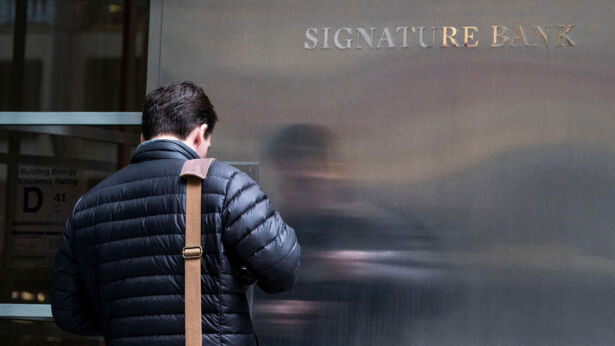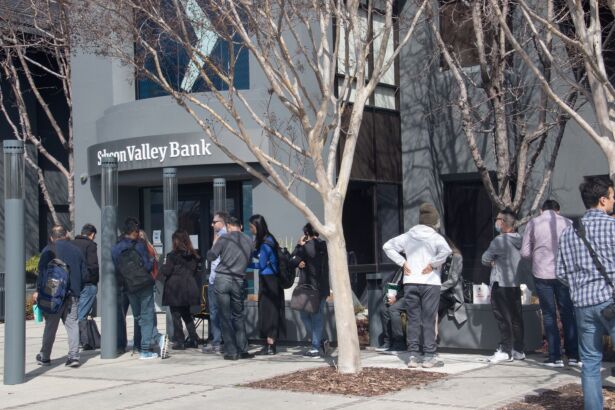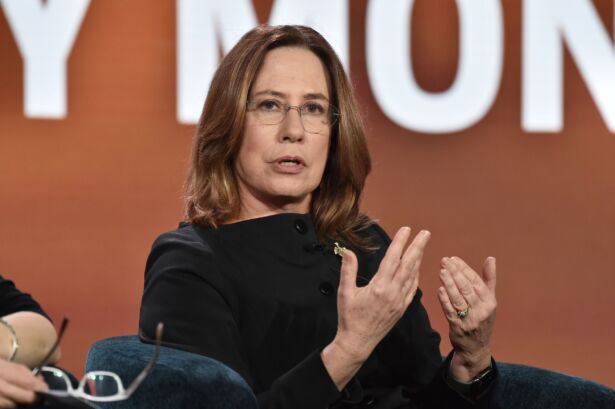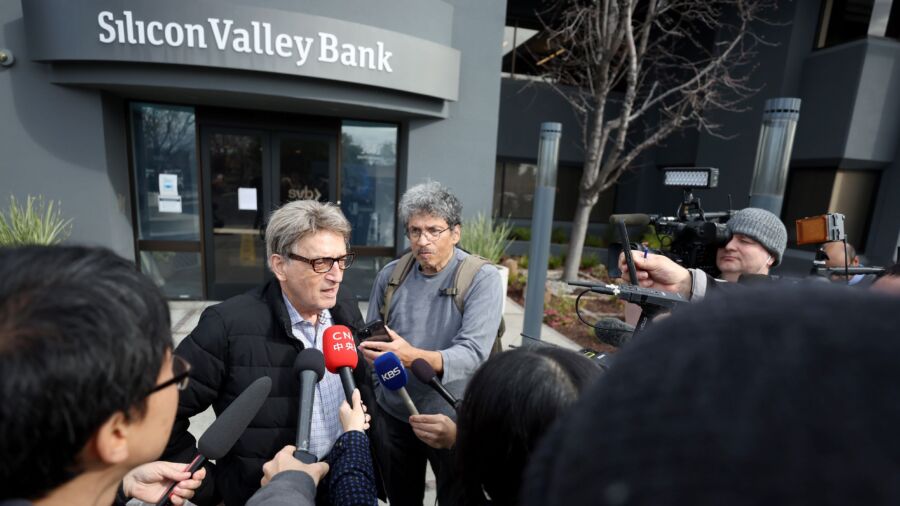Shareholders of the collapsed Silicon Valley Bank (SVB) have filed a class action lawsuit against the institution, its CEO Greg Becker, and CFO Daniel Beck, alleging violations of securities laws by concealing the bank’s vulnerability to a bank run.
The shareholders claim in a complaint (pdf) filed Monday in federal court in San Jose, California that SVB and its executives failed to disclose how rising interest rates would undermine the bank’s business model and leave it worse off than banks with different client bases.
The lightning-fast collapse of SVB came after it took a $1.8 billion loss on a forced $21 billion bond liquidation last week and then announced it was looking to raise $2.25 billion in capital to fill the hole.
Spooked depositors rushed to withdraw their money in a classic bank run, sending SVB shares—and those of other banks—plunging.
This prompted U.S. financial authorities to assume control of the bank and, on the basis of a “systemic risk exception,” waive the usual $250,000 deposit insurance coverage limit and offer to reimburse all SVB depositors fully in a bid to shore up confidence in the banking system and stem contagion.
The collapse of SVB marked the second-biggest bank failure in U.S. history.
‘Particularly Susceptible to a Bank Run’
The shareholders allege in their complaint that SVB and its top executives failed to warn investors that, under an environment of rising interest rates, the unit was “particularly susceptible to a bank run.”
The filing says the bank should have warned investors that “it would be worse off than banks that did not cater to tech startups and venture capital-backed companies” in circumstances where the Federal Reserve hiked rates aggressively to curb soaring inflation.
Becker and Beck are also accused of intending to “deceive” investors or of acting with “reckless disregard for the truth” when they failed to determine and disclose the “true facts” in statements to investors. The lawsuit claims that the defendants’ public statements were materially false and/or misleading, in violation of the Securities Exchange Act of 1934.
The lawsuit, which is led by The Rosen Law Firm, seeks unspecified damages.
SVB did not immediately respond to an inquiry from The Epoch Times, while attorneys for Becker and Beck were not immediately available for comment.

Signature Bank Also Hit With Lawsuit
The Rosen Law Firm has also launched a class action lawsuit against the failed Signature Bank and its top executives, alleging violation of federal securities laws by allegedly misrepresenting “adverse facts” pertaining to the health of the bank’s business.
State regulators closed the New York-based Signature Bank on March 12, marking the third-largest bank failure in U.S. history.
The Epoch Times has reached out to Signature with a request for comment on the lawsuit.
The twin failures of SVB and Signature Bank have sparked a stock rout, with major U.S. banks losing around $90 billion in market value on Monday.
Sharp selloffs on Monday morning triggered trading circuit breakers on over a dozen U.S. banks, with a number of financial institutions ending the day deep in the red. Hardest hit were regional banks, with First Republic down nearly 62 percent and Western Alliance falling nearly 47 percent at close of the day.
Over the past three trading sessions, U.S. banks have lost nearly $190 billion in market value. Global bank stocks have also taken a beating amid contagion fears.
‘Your Deposits Will Be There’
Shockwaves from the twin failures continued to pound global bank stocks on Tuesday as assurances from President Joe Biden and other policymakers did little to calm markets.
Biden on Monday sought to reassure markets and depositors that the U.S. banking system is “safe” after U.S. financial authorities, including the Federal Reserve, announced emergency measures to shore up banks by giving them access to additional funding and expanding deposit insurance coverage for depositors of SVB and Signature.
Biden said the actions mean that “Americans can have confidence that the banking system is safe,” while also promising stiffer regulation.
“Your deposits will be there when you need them,” Biden insisted.
Despite the emergency measures, anxiety has remained high about possible systemic risk in the banking sector. There have been reports of depositors, nervous about access to their savings, lining up outside regional bank branches.
“Bank runs have started [and] interbank markets have become stressed,” Damien Boey, chief equity strategist at Sydney-based investment bank Barrenjoey, told Reuters.
“Arguably, liquidity measures should have stopped these dynamics but Main Street has been watching news and queues—not financial plumbing.”

Meanwhile, customers of SVB were given full access to all their deposits on Monday.
The Federal Deposit Insurance Corporation (FDIC), which was appointed receiver of SVB, has pledged to make all depositors of the bank whole so they don’t lose any money.
The FDIC also set up a so-called bridge bank—called Silicon Valley Bridge Bank, N.A.—to which the assets of SVB have been transferred.
Depositors and borrowers automatically became customers of Silicon Valley Bridge Bank, while Tim Mayapoulos has been appointed its CEO.
Mayapoulos, a former CEO of federal mortgage finance firm Fannie Mae, said in a letter to clients that the bank was open and conducting business as usual.
“I recognize the past few days have been an extremely challenging time for our clients and our employees, and we are grateful for the support of the amazing community we serve,” Mayopoulos said.
Setting up a bridge bank is also a way to help improve recoveries for creditors, who stand to lose money in the failure.
“No losses associated with the resolution of Silicon Valley Bank will be borne by taxpayers. Shareholders and certain unsecured debt holders will not be protected. Senior management has also been removed,” the FDIC said.
Blanket Coverage?
There have been some calls for the FDIC to waive its $250,000 deposit insurance cap not just for SVB and Signature Bank but provide blanket coverage for all bank deposits across the United States amid concerns that regional banks face systemic risk.
Normally, the FDIC covers deposits at insured financial institutions like banks and credit unions up to $250,000 per account, with amounts over that cap considered uninsured and subject to losses in case of a failure.
But under a special “systemic risk exemption” granted to SVB and Signature Bank, the FDIC is covering all deposits at the two institutions, a move known as “blanket coverage.”
It’s reminiscent of the FDIC’s decision during the 2008 financial crisis to expand its protection to unlimited deposit insurance for business checking accounts.
While radical steps like blanket coverage can calm markets by promising that depositors won’t lose any money—even the normally uninsured portions of their deposits—moves like that are highly controversial.
The FDIC’s deposit insurance fund, which is around $128 billion, is insufficient to cover all deposits in U.S. banks, which run into the trillions of dollars.
While the FDIC has the power to impose additional assessments—basically insurance premiums—on healthy banks to cover some of the funding shortfall if it runs out of money covering deposits at multiple failing banks, this would stress the banking sector at a time when it can least handle additional burdens.
Under such circumstances, there are emergency funding mechanisms from the Treasury that the FDIC could draw on to bridge the gap. But this would put taxpayer dollars at risk, at least until the FDIC were to repay by additional bank assessments any temporary emergency loans from the government.
‘Something Broader Going On’?
Former FDIC Chair Sheila Bair told Fox News on Monday that the declaration of “systemic risk exceptions” under which the agency is providing blanket coverage to SVB and Signature are problematic because they suggest “something bigger and broader” is going on behind the scenes.

“Silicon Valley Bank in particular, that was an unusual situation. They had an unusual deposit base, rapid growth, terrible interest [rate] risk management—there’s just a lot of idiosyncratic things about that bank that led to its failure,” Bair told the outlet.
“But with these systemic risk exceptions, and packaging it with Signature, it suggests that there’s something broader going on, and I don’t know if that’s the case or not, but the markets obviously think there is and, more troubling, uninsured depositors think there is,” Bair continued.
While Bair said she doesn’t see the threat of wide-scale runs on uninsured deposits in the United States, regulators may be seeing that risk emerging.
If there are signs of systemic risk in the U.S. banking sector, Bair said it’s likely regulators would do “something truly systemic, not just these one-off things for a couple of banks because that just puts pressure on the other banks who don’t have the systemic risk designation.”
Bair called for “better communication and clarity” from U.S. financial authorities about why SVB and Signature got the systemic risk designation, adding that “if there’s a broader problem, why aren’t you taking broader steps?”
Several days before SVB failed, the current FDIC Chairman Martin Gruenberg said that that rising interest rates have had “dramatic effects on the profitability and risk profile of banks’ funding and investment strategies,” while warning that U.S. banks had unrealized losses just on longer-dated securities of around $620 billion.
“The good news about this issue is that banks are generally in a strong financial condition, and have not been forced to realize losses by selling depreciated securities. On the other hand, unrealized losses weaken a bank’s future ability to meet unexpected liquidity needs,” Gruenberg said.
SVB’s failure was sparked when it took $1.8 billion in losses after liquidating much of its Treasury portfolio, which dropped in value owing to interest rate hikes.
From The Epoch Times


